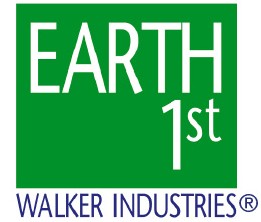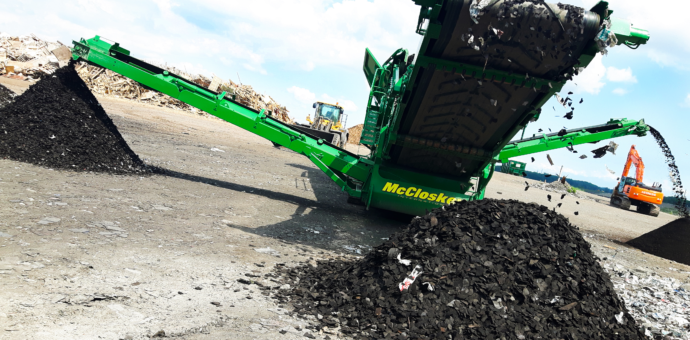 Nicole Ramberg
Nicole Ramberg
January 27th, 2021
BURLINGTON, ON
Reduce, reuse, recycle: the mantra of sustainability. We all know that these three actions are vital in the path to becoming more sustainable, but implementing them is something quite different.
There is now an acceptance of the need to use our resources, whatever they might be, differently if we are to keep this planet alive.
 One Ontario Corporation has found that they could get into the business of the three R’s – they have been doing just that since the founding of the company in 1887. One of the more recent projects is the recycling of roofing shingles.
One Ontario Corporation has found that they could get into the business of the three R’s – they have been doing just that since the founding of the company in 1887. One of the more recent projects is the recycling of roofing shingles.
At Walker Industries, everything from budgeting to acquisitions to policy creation is filtered through their “SEE model” – emphasizing the importance of social, environmental and economic sustainability as a core values.
Walker Industries started out as, and remains, a family-owned company that offers a range of products and services including aggregates, construction, concrete, biosolids management, and alternative low carbon fuels, to name a few. So, what is it that makes them stand out from competing companies?
For starters, they are Canada’s largest fully integrated resource recovery company, steadily increasing the tonnes of resources recovered every year. This refers to the resources that would otherwise end up in landfills, but are instead kept in use, being recycled, repurposed and reused.
Walker accepts asphalt shingles at its Thorold location and repurposes them to be used as recycled asphalt products – just one example of their commitment to resource recovery.

The shingles are shredded and then ground up into usable products.
They recover the shingles that roofers dumped at transfer stations in the Toronto area and have a contract with the Niagara Region to take any roofing shingles that are dropped off there.
They grind the shingles, separate out any portion that isn’t recyclable and then grind the balance into small, almost sand-like pieces that have been used as bedding for large pipes in the liquid transportation business. The grindings replace the use of stone bedding for the large pipes.
The people at Walker talk in terms of lessening the need to rely on virgin products when a recycled product can do the job just as well. The shingle grindings get used when temporary roads are needed in landfill sites.
The project, begun in 2016, was profitable from the year it started. In 2019 they took in 20,000 tons of shingle and turned out close to 98% reusable product. Less expensive and easier on the environment.
While a private company, Walker Environment puts out an annual report. Last year they reported a 30% reduction in electricity use, over 1000 hours of employee volunteer hours and a 212% increase in shingles processed to recycled asphalt.
Recently, Walker Industries entered into a project with Enbridge and Comcor Environmental, to construct the largest renewable natural gas plant in Ontario. The facility, which will be located in Niagara, is expected to generate energy to heat the equivalent of 8,750 homes annually, and reduce greenhouse gas emissions by 48,000 tonnes.
Walker will play an important role in the partnership – they will be capturing gas from their Niagara landfill, processing it into renewable natural gas, and injecting it into the Enbridge distribution network. The project is currently underway and is expected to be finished by the end of the year.
Sustainability requires a collective effort. Walker has been involved with Sustainable Hamilton Burlington advisory group for quite a while, with Walker Emulsions being a Sustainability Leadership Program member. The involvement has allowed for learning opportunities, credible recognition and ultimately contributing to a more sustainable economy.

In 2013 the Walker Environment Group decided that they could reduce greenhouse gas emissions by 4 megatons if they turned the temperature in all their office locations down two degrees. Staff were asked to wear a sweater to work – something funky to make it interesting. The staff went one further – they decided they would hold sweater contests and they had people knitting during their lunch hour. For the Walker group of companies it is all part of the Earth First approach to business.
Sustainability efforts at Walker go beyond its partnerships and business operations. Input from employees have driven different initiatives, like shoreline cleanups or participating in Habitat for Humanity community projects. What started as hobby beekeeping amongst a few employees turned into a project with Niagara College’s commercial beekeeping program – allowing for those precious pollinators to do their thing around their landfill in Niagara.
Tim Murphy, VP of Environmental Performance at Walker offers the following for people who want to inject more sustainable thinking into their organizations:
1. Understand what sustainability means to your organization – often environmental is the first to come to mind, but there is also social and economic sustainability to take into account
2. Understand where you’re at currently – where do you stand after determining what sustainability looks like?
3. Come up with a plan to address expectations – once you know what sustainability means and where you stand, what do you want moving forward?
4. Be realistic – It’s easy to have big goals, but can they actually be achieved and sustained long-term?
5. Approach goals accordingly – sustainability is a long-term journey, and the longer sustainable operations are in place the less they are a project, and the more they become a part of work culture
As with any organization, things are not perfect. Challenges and obstacles present themselves in the face of pursuing environmental, economic and social sustainability. What’s important is continuing to learn, adjust, and move forward in the journey to becoming more sustainable.
It is certainly do-able. Walker Environmental made a very profitable business out of it.
Nicole Ramberg is a graduate of McMaster University where she completed a Bachelor of Science in Environmental Sciences. She is currently a student at Fleming College in Lindsay ON, where she is studying Ecosystem Management Technology.


















